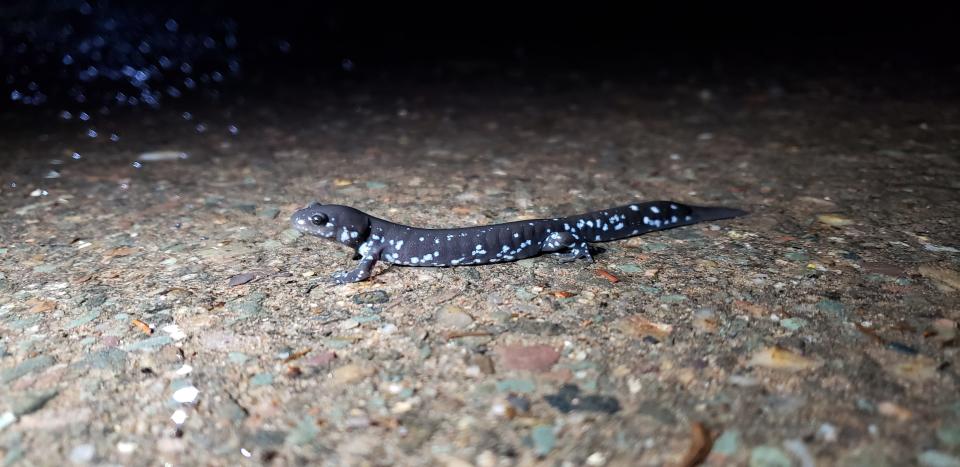Michigan park closes road for a month to let blue-spotted salamanders cross
DETROIT – A Marquette city park is closing a portion of its lone road for a month to help out some local residents: blue-spotted salamanders.
The salamanders spend the cold, snowy winters underground in Michigan's Upper Peninsula. Then every spring, almost in unison, they make their way to nearby pools, where they mate and lay eggs. But at Presque Isle Park, that means crossing a solitary roadway looping through the popular 323-acre, forested park on a peninsula jutting into Lake Superior.
Eli Bieri, a biology student at nearby Northern Michigan University, studied the blue-spotted salamanders as part of his research, going out nights with student volunteers in the spring to count and tag the amphibians.

"We would see thousands and thousands of salamanders crossing the street in just one night," he said. "It was really amazing – until we see cars zip by and squish salamanders. That really troubled me – it kept me awake at night."
Bieri counted the road-killed salamanders on that stretch of Peter White Drive in the spring of 2019, and found 429 carcasses. "And their carcasses are popular food for seagulls, foxes and raccoons, so we probably missed a few," he said.
That's 10% to 20% of the park's blue-spotted salamander population, according to Bieri's research – an alarming number that risks permanently depleting the park's population, he said.
He enlisted the help of the Superior Watershed Partnership and Land Conservancy, a local nonprofit organization involved in conservation and public education projects.
"Blue-spotted salamanders are not an endangered species, but their range is so small," said Tyler Penrod, a program manager with Superior Watershed Partnership.
Penrod reached out to Marquette city officials, and last spring got the relevant stretch of road within the park temporarily closed to evening and overnight vehicular traffic – when the emerging salamanders are on the move. The result: only three road-killed salamanders were counted. "Those were probably from bicycles or people inadvertently stepping on them," Bieri said.
With that success demonstrated, city officials are doing the same this year. From March 15 to April 15, the park's road in the stretch where the salamanders cross will again be closed to motorized vehicle traffic overnight.
Blue-spotted salamanders are native to North America, with habitat ranging from the Atlantic Coast to the Great Lakes and up into parts of Canada. Adults reach from 4 to 5.5 inches, with bluish-black skin and distinctive bluish-white spots on their bodies.
The salamanders play an important role in Midwest ecosystems. As amphibians, starting out life living in and breathing water before developing lungs and moving to land as adults, they're a staple food source for fish, small mammals, birds and reptiles.
Closing Peter White Drive to vehicle traffic for the month means park-goers have to trek by foot or bicycle about a quarter-mile to popular Sunset Point on Lake Superior. A few patrons grumbled, but most have been very supportive, Penrod said.
"We've demonstrated this is successful in preventing hundreds of unnecessary deaths of these salamanders," he said.
Now, area residents are coming out on cold, rainy spring nights, wearing raincoats and headlamps or carrying flashlights, to take in the blue-spotted salamander parade (look but don't touch, Bieri said).
This article originally appeared on Detroit Free Press: Michigan park road where salamanders died closes for animal safety

